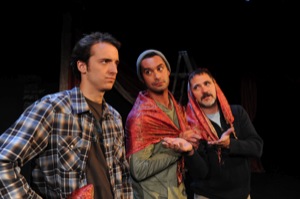Theater
‘Moscow’
Jon (John Whitley), Matt (Angelo D’Agostino) and Luke (Kevin Koppman-Gue) are holed up in an empty theater. There is no exit (Sartre had it right) and no apparent reason for their dilemma; the only clue is a copy of Chekhov’s Three Sisters in Russian.
What now? Why, a gay existentialist musical called Moscow, of course. Nick Salamone wrote the book and lyrics; Maury R. McIntyre the music, and Ira Spector directs Moscow through May 30 at Diversionary Theatre.
Jon, a middle-aged, failed playwright, happens to know Russian and takes on the job of translating the play (which he will direct, by default) to give them something to do. Jon has loved and lost too many friends and lovers to AIDS; in self-defense he’s closed up shop in the romance department: “My salad days are over. Hell, my meat and potatoes days are over!” Jon will play oldest sister Olga.
Matt is younger, a gay romantic idealist and still-virgin, whose only performing experience was singing Diana Ross songs on street corners with his slightly dotty mother – in Mosco, Idaho. Matt is cast as desperate housewife Masha.
Luke, a needy street hustler from Mobile, lives for the next sexual encounter; being stuck in this room with this pair makes him suspect he might be dead and/or in hell, questions he asks repeatedly. A major sockball enthusiast (which they play when not rehearsing), Luke is an utterly uninterested actor. Jon drafts him to play the youngest, most agitated sister Irina.
From a trunk on the stage, three pieces of fabric are extracted which will serve as scarves for Olga and Masha and a skirt for Irina, and they’re off on the play within the play. As time goes on, characteristics meld, and by the end we realize the trio’s story mirrors that of Chekhov’s sisters, complete with thwarted romance and a bit of psychological introspection.
It’s an intriguing notion, an existentialist musical, and for the first act it works pretty well. The shift back and forth is amusing, the songs tricky and interesting, the characters fun.
In fact, a few of the songs (augmented beautifully by a piano/violin/flute trio) are quite lovely – Matt’s “Becoming Me,” Luke’s “Touch,” and Jon’s “Behind Me” come to mind. But Salamone suffers from a version of what I call “Sondheim Syndrome”: He crams as much character development into the music allotted as possible, with a blizzard of words leaving the audience gasping to keep up and vaguely suspecting there might be a quiz at the end. Oklahoma! it ain’t. What’s wrong with dialogue as a character development vehicle?
Moscow has its strengths. First produced in Los Angeles in 1998, it went on to win the top honor at the Edinburgh Festival that year.
By the end of my viewing, despite the Herculean efforts of a talented cast (though D’Agostino needs to conquer his flatness on long final held notes), I left with the opinion that Salamone and McIntyre did what they wanted to do. But I couldn’t answer one question: Why did this seem a good idea?
Moscow plays through May 30, 2010, at Diversionary Theatre. Shows Wednesday and Thursday at 7:30 p.m.; Friday at Saturday at 8 p.m.; Sunday at 2 and 7 p.m. For tickets call (619) 220-0097 or visit www.diversionary.org.
|
|
Copyright © 2003-2025 Uptown Publications


